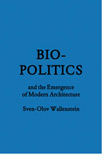Biopolitics and the Emergence of Modern Architecture concerns the dissolution of the classical paradigm of architecture as imitative form in the context of the French Enlightenment, and analyzes the emergence of a new logic of architecture based on a biopolitical process of subject formation. Wallenstein draws especially on the late work of Michel Foucault for his argument and distinguishes Foucault’s theory of biopolitics from that of Giorgio Agamben.
Published shortly after the release of the first English translation of Foucault’s The Birth of Biopolitics, this is the first volume that specifically relates the biopolitical concept to architecture. The book concludes with a pictorial essay on the development over the last two centuries of the modern hospital, a building type that epitomizes the unfolding of this new architectural logic.


